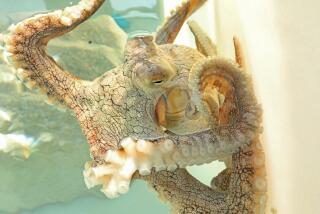Soccer scores goal in Senate
SACRAMENTO — After years of assertive lobbying by Adidas, the California Senate voted Tuesday to legalize the import and sale of kangaroo skins so that soccer players can buy shoes made from the marsupials’ coveted leather.
While the kangaroo bill advanced, the Assembly refused to ban certain plastics used in children’s products, but agreed to require bullets to carry identification numbers to help police trace them back to their guns.
The Senate kangaroo bill, which has pitted the Los Angeles Galaxy and CD Chivas USA soccer teams and sporting goods stores against animal rights activists, would ease California’s 37-year import ban on kangaroo products.
The bill passed in the Senate -- after four years of failed efforts -- would allow a kangaroo product to be imported and sold in California if the species is not otherwise protected by laws here and abroad.
Of the 55 species of kangaroos in Australia, six are commercially harvested and exported, and would be allowed if the bill is approved by the Assembly and signed by Gov. Arnold Schwarzenegger. Those species include red and eastern and western gray kangaroos.
Animal activists are fighting the proposal, which they say will lead to the deaths of endangered kangaroos because hunting is done at night and the species are difficult to differentiate. They also object to the rules of kangaroo hunting, which dictate that if a mother is killed the baby must be killed as well.
Lauren Ornelas, an activist with Davis, Calif.-based Viva USA, said Adidas “is relentless in pushing to get this bill through.”
Malcolm Turnbull, a representative of the Australian government, told the Senate that such a change in California law would not lead to the deaths of any endangered kangaroo species and that different species are “readily distinguishable.”
Since 2003, the first year the bill was introduced, Adidas America has spent $435,693 lobbying the Legislature, state filings show.
The company is also fighting a legal challenge from Viva USA that alleges it is violating California’s law by using kangaroo skins in its high-end cleats. The company denies the charge and has won initial court rulings; an appeal is pending before the California Supreme Court.
Adidas said in a statement that it was confident California’s highest court would rule that the state’s endangered species law is unenforceable because it conflicts with federal law.
The company would not answer questions about the bill pending in Sacramento, SB 880, carried by Sen. Ron Calderon (D-Montebello). The measure passed the Senate 27-8, with five senators not voting.
Soccer players crave kangaroo leather for its light weight, and both professional teams and amateur leagues have expressed support for the bill.
In written testimony, Alexi Lalas, president of the Los Angeles Galaxy, said that California’s law has put his team at a competitive disadvantage with the rest of Major League Soccer.
“Because my team represents California in a highly competitive sport, I believe that the full array of soccer products should be locally accessible to and be available for purchase by our players here in California,” Lalas wrote to the Senate last month. “It is unfair to have these products freely available for commercial purchase in all of the other 49 states and not here.”
In the current pro soccer season, which began in April, the Galaxy has won one game, lost three and tied twice, placing it in fifth place out of six in its division. Chivas, also based in Los Angeles, is in third place with a 3-3-2 record.
Also Tuesday, the Assembly passed a bill backed by more than 40 police chiefs, including Los Angeles Police Chief William J. Bratton. The measure would require all new semiautomatic pistols sold in the state, starting in 2010, to include technology that imprints casings with the make, model and serial number of the gun that fired the bullet.
Assemblyman Mike Feuer (D-Los Angeles), author of AB 1471, argued that the requirement would help investigators find and convict more killers.
“About 45% of all homicides in California are never solved for want of evidence,” Feuer said. “But we have the technology now to prevent killers from killing again, to bring them to justice.”
After debate, the bill passed 44-29 with no Republican support.
Republicans argued that “microstamping” technology would fail over time, could be easily circumvented by criminals and would enable people to frame others for shooting crimes.
Last year, the Assembly rejected a similar bill by former Assemblyman Paul Koretz (D-West Hollywood). Feuer’s bill goes next to the Senate.
On a 36-31 vote, the Assembly rejected a bill that would have banned a group of chemicals called phthalates in toys, bottles, nipples and other products designed for children younger than 3. Mainly used to make plastic flexible, phthalates have been linked to testicular and liver damage in some studies. Last week at an international conference, top environmental scientists warned that many common chemicals, including phthalates, have the potential to alter fetal and infant development.
“Phthalates are leaching into our babies’ bodies, and the evidence of its effects are overwhelming,” said Assemblywoman Fiona Ma (D-San Francisco), the bill’s author.
Several Democrats, including Charles Calderon of Montebello and Hector De La Torre of South Gate, refused to support the bill, and Republicans expressed skepticism.
“I just felt the science was not in to justify an across-the-board ban,” said Assemblyman Cameron Smyth (R-Santa Clarita).
nancy.vogel@latimes.com
More to Read
Inside the business of entertainment
The Wide Shot brings you news, analysis and insights on everything from streaming wars to production — and what it all means for the future.
You may occasionally receive promotional content from the Los Angeles Times.






